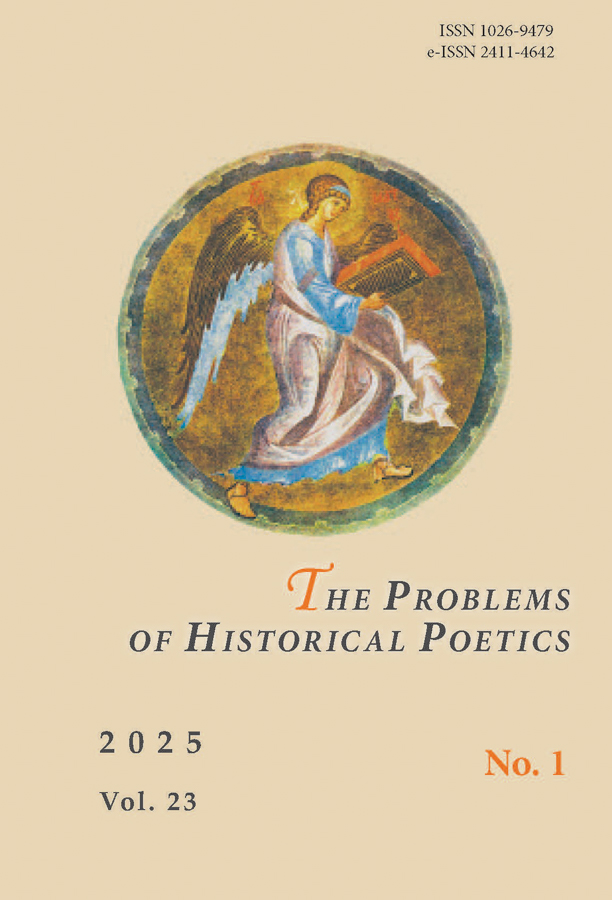The idiom “twice two is four” in Russian literature of the 20th century
- Authors: Shaulov S.S.1
-
Affiliations:
- Vladimir Dahl Russian State Literary Museum
- Issue: Vol 18, No 3 (2020)
- Pages: 266-289
- Section: Articles
- URL: https://journal-vniispk.ru/1026-9479/article/view/285850
- DOI: https://doi.org/10.15393/j9.art.2020.8182
- ID: 285850
Cite item
Full Text
Abstract
The idiom “twice two is four” along with its variations is seen in the article as a marker of the situation of an “underground man”. In literature of the twentieth century the “underground” in its ethical and philosophical aspects has expanded its meaning, becoming the context of a utopian and anti-utopian thought, absorbing the tragic experience of Russian culture after Dostoevsky. Of course, the widespread locution “as sure as twice two is four” does not always point at this variety of meanings, but it can be reached only in combination with the psychological type of the “underground man”. Thus, the image of Stalin in the novel The First Circle by Alexander Solzhenitsyn is considered as a variation of the “underground” consciousness. The problems of philosophical, history related to the evolution of this type of consciousness and actualized in this novel, remain important for modern literature. Another version of this philosophical collision is given in Victor Pelevin’s anti-utopian novel S.N.U.F.F. In both of these cases, the situation of the underground person becomes a picture of a psychological and historical catastrophe. The negative development of the analyzed arithmetic formula in Russian literature of the 20th century encourages to look for another pole of tradition outside the “main” cultural domains. One of the variants of a moral escape from the trap of the “underground consciousness” can be found in the poetry of Alexander Bashlachev. The mythopoetical plot of the song Verka, Nadka, Lyubka is an exceptional variant of the development of the “underground man” topic. A starting point of the plot is just the formula “twice two is four”. The genre shift from lyricism to allegorical epic gives the poet an opportunity to reconstruct the paskhal’nost’ (Easter ideal) of Russian culture, even if in a tragic and provocative form, close to the tradition of Russian foolishness for Christ.
About the authors
Sergey S. Shaulov
Vladimir Dahl Russian State Literary Museum
Author for correspondence.
Email: sschaulov@gmail.com
The House-Museum of M. Yu. Lermontov, PhD in Philology, Head of the House-Museum of M. Yu. Lermontov
Russian Federation, MoscowReferences
- Bogdanov A. A. Tektologiya. Vseobshchaya organizatsionnaya nauka [Textual Criticism. Universal Structural Science]. Moscow, Direkt-media Publ., 2014, part 1. 408 p. (In Russ.)
- Dukkon Á. The Dialogue Between Texts: Vissarion Belinsky’s “Voice” in Fedor Dostoevsky’s “Notes from the Underground”. In: Kul’tura i tekst [Culture and Text], 2013, no. 1 (14), pp. 4–28. (In Russ.)
- Esaulov I. A. Mistika v russkoy literature sovetskogo perioda (Blok, Gor’kiy, Esenin, Pasternak) [Mysticism in Russian Literature of the Soviet Period (Blok, Gorky, Esenin, Mayakovsky)]. Tver, Tver State University Publ., 2002. 67 p. (In Russ.)
- Esaulov I. A. Paskhal’nost’ russkoy slovesnosti [Paskhal’nost’ of Russian Literature]. Moscow, Krug Publ., 2004. 560 p. (In Russ.)
- Zakharov V. N. The Motif of Freedom in the Plot of “Notes from the Underground” by F. M. Dostoevsky. In: Zhanr i kompozitsiya literaturnogo proizvedeniya: istoriko-literaturnye i teoreticheskie issledovaniya. Mezhvuzovskiy sbornik [Genre and the Composition of a Literary Work: Historical-literary and Theoretical Researches. Interuniversity Collection]. Petrozavodsk, Petrozavodsk State University Publ., 1989, pp. 107–110. (In Russ.)
- Zakharov V. N. How Much is Two and Two, or the Unobviousness of the Obviousness in Fedor Dostoevsky’s Poetics. In: Voprosy filosofii, 2011, no. 4, pp. 109–114. (In Russ.)
- Krasnov V. Solzhenitsyn i Dostoevskiy: iskusstvo polifonicheskogo romana [Solzhenitsyn and Dostoevsky: The Art of a Polyphonic Novel]. Moscow, 2012. 202 p. (In Russ.)
- Nazirov R. G. On the Ethical Problems of F. M. Dostoevsky’s Story “Notes from the Underground”. In: Dostoevskiy i ego vremya [Dostoevsky and His Time]. Leningrad, Nauka Publ., 1971, pp. 143–153. (In Russ.)
- Nazirov R. G. The Autonomy of a Literary Hero. In: Problemy tvorchestva F. M. Dostoevskogo. Poetika i traditsii [Problems of F. M. Dostoevsky’s Works. Poetics and Traditions]. Tyumen, 1982, pp. 3–11. (In Russ.)
- Naumov L. A. Aleksandr Bashlachev: chelovek poyushchiy. Stikhi, biografiya, materialy, interv’yu [Alexander Bashlyachev: A Singing Man. Poems, Biography, Materials, Interviews]. Moscow, Vyrgorod Publ., 2017. 608 p. (In Russ.)
- Petrova M. G. The Fate of the Author and the Fate of the Novel. In: Solzhenitsyn A. I. V kruge pervom [Solzhenitsyn A. I. The First Circle]. Moscow, Nauka Publ., 2006, pp. 629–732. (In Russ.)
- Sytina Yu. N. “…Twice Two Is Mathematics. Try to Contradict It”: Objections of Dostoevsky and the Russian Classics. In: Dostoevskiy i mirovaya kul’tura: al’manakh [Dostoevsky and World Culture: Almanac]. St. Petersburg, Serebryanyy vek Publ., 2018, no. 36, pp. 47–55. (In Russ.)
- Sytina Yu. N. On Some Features of Dostoevsky’s “Arithmetic”. In: Vestnik Russkoy khristianskoy gumanitarnoy akademii [Herald of the Russian Christian Institute for Humanities], 2019, vol. 20, issue 2, pp. 287–299. (In Russ.)
- Uspenskiy B. A. Anti-behaviour in the Culture of Ancient Russia. In: Uspenskiy B. A. Izbrannye trudy [Uspensky B. A. Selected Works]. Moscow, Yazyki russkoy kul’tury Publ., 1996, vol. 1, pp. 460–476. (In Russ.)
- Shaulov S. S. Poeziya A. N. Bashlacheva: v poiskakh «osnovnogo mifa» [A. N. Bashlachev’s Poetry: in Search of the “Main Myth”]. Ufa, Bashkir State Pedagogical University named after M. Akmulla Publ., 2011. 80 p. (In Russ.)
- Shaulov S. S. Pelevin’s “Dostoevsky”: Features of the Dialogue Between the “Postmodernist” and the Classic. In: Dostoevskiy i sovremennost’. Materialy XXVIII Mezhdunarodnykh Dostoevskikh chteniy 2013 goda [Dostoevsky and Modern Age. Materials of the 28th International Dostoevsky Readings in 2013]. Novgorod the Great, 2014, pp. 233–242. (In Russ.)
- Shaulov S. S. Madness as an Aesthetic and Life Strategy: Some Variants of the Plot Scheme. In: Semiotika povedeniya i literaturnye strategii, Lotmanovskie chteniya XXII [The Semiotics of Behavior and Literary Strategies. The 22nd Lotman Readings]. Moscow, The Russian State University for the Humanities Publ., 2017, pp. 369–386. (In Russ.)
Supplementary files











